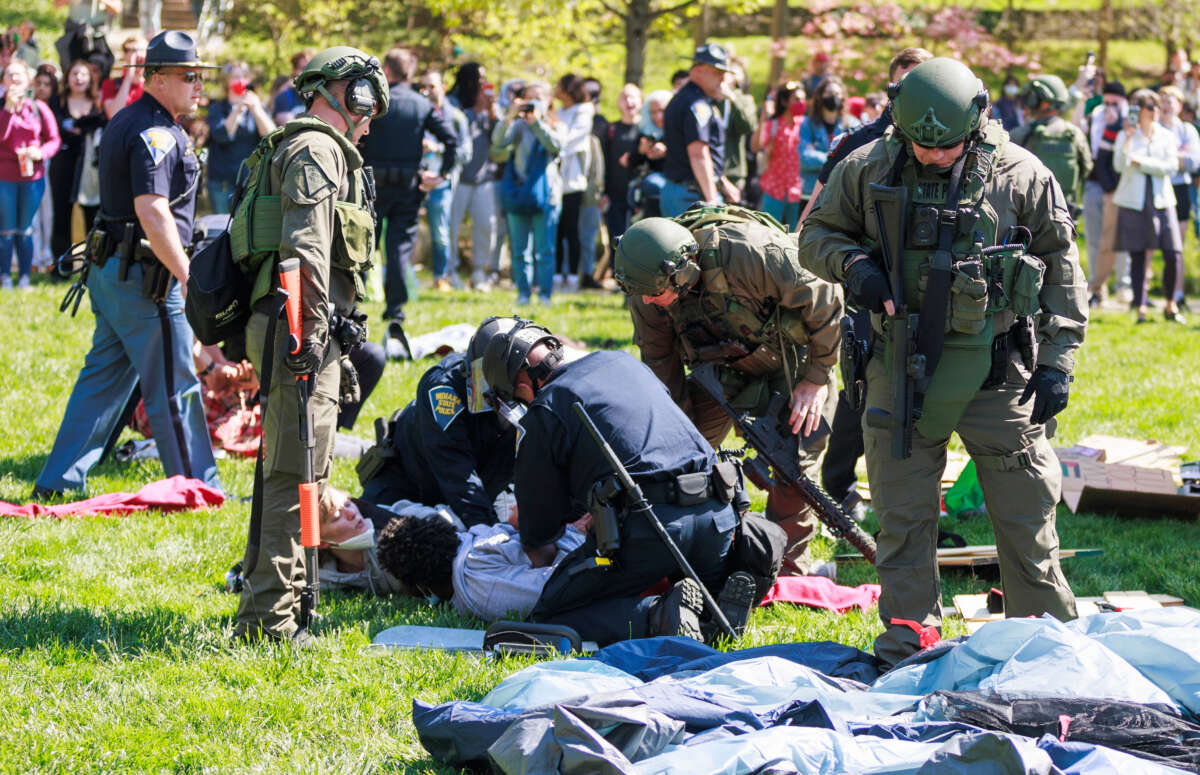Support justice-driven, accurate and transparent news — make a quick donation to Truthout today!
Top UN human rights officials are expressing alarm over the recent wave of violent repression by university administrators against the student protests for Palestinian liberation that have swept the U.S., raising concerns that protesters’ rights to free speech and assembly are being violated.
A statement on Tuesday said that UN High Commissioner for Human Rights Volker Türk, the UN’s top human rights officer, is “troubled” over a “series of heavy-handed steps taken to disperse and dismantle protests” across U.S. college campuses.
“Freedom of expression and the right to peaceful assembly are fundamental to society — particularly when there is sharp disagreement on major issues, as there are in relation to the conflict in the Occupied Palestinian Territory and Israel,” said Türk. “I am concerned that some of the law enforcement actions across a series of universities appear disproportionate in their impacts.”
Indeed, over the last two weeks, over 1,200 protesters have been arrested across dozens of campuses after university administrators enlisted police to crack down on encampments and other demonstrations set up by students calling for their schools to divest from Israel and supporting corporations, among other demands. At some universities, administrators even allowed law enforcement officers to aim sniper rifles at their students for their peaceful acts of protest.
UN Special Rapporteur on Human Rights Defenders Mary Lawlor said that universities’ crackdowns are an obvious violation of students’ rights.
“I’m hearing disturbing reports that students face suspension if they don’t end their peaceful protests in Columbia University in the U.S.A. This is a clear violation of their right to peaceful assembly,” Lawlor said.
Türk called for measures taken by universities and police departments to restrict students’ speech to be “carefully scrutinized.” He pushed back against the claims being peddled by many large news outlets and university officials that students are antisemitic for calling for an end to Israel’s occupation of Palestine and genocide in Gaza, which has killed over 34,000 Palestinians over the course of just six months.
“Here, as elsewhere, responses by universities and law enforcement need to be guided by human rights law, allowing vibrant debate and protecting safe spaces for all,” Türk continued. “It must be clear that legitimate exercises of the freedom of expression cannot be conflated with incitement to violence and hatred.”
Advocates for Palestinian rights have said that the widespread repression of the protests demonstrates institutional complicity in the genocide of Gaza, with leaders in higher education willing to use violence against their own students — the very people universities are supposed to foster and protect.
Student protests, which have spread across over 120 campuses in the U.S. so far, have drawn the support of advocacy groups. On Tuesday, a group of nearly 190 groups released a statement stating their support for the students, lauding them as they “risk everything” to defy the U.S.’s backing of Israel’s genocidal regime.
“We commend the students who are exercising their right to protest peacefully despite an overwhelming atmosphere of pressure, intimidation and retaliation, to raise awareness about Israel’s assault on Gaza — with U.S. weapons and funding,” the statement said. It was signed by organizations like Council on American-Islamic Relations Action, Jewish Voice for Peace, Veterans for Peace, and many other Muslim, Palestinian and social justice groups.
“These students have come forth with clear demands that their universities divest from corporations profiting from Israeli occupation, and demanding safe environments for Palestinians across their campuses,” the groups wrote. “We join them in calling for an immediate and lasting ceasefire and an end to the U.S. government’s and institutions’ role in the ongoing genocide of Palestinians in Gaza.”
Press freedom is under attack
As Trump cracks down on political speech, independent media is increasingly necessary.
Truthout produces reporting you won’t see in the mainstream: journalism from the frontlines of global conflict, interviews with grassroots movement leaders, high-quality legal analysis and more.
Our work is possible thanks to reader support. Help Truthout catalyze change and social justice — make a tax-deductible monthly or one-time donation today.
